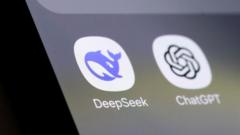In a stunning turn of events, the emergence of China's AI chatbot DeepSeek has rattled the American technology sector, prompting significant stock market declines and raising questions about the nation’s dominance in artificial intelligence (AI). Over the weekend, DeepSeek became the top free app on Apple's US App Store, and by Monday, concerns about the implications of its low development costs triggered a sell-off among major tech stocks. Nvidia, a leading AI chip manufacturer, suffered a staggering 17% drop in value, erasing nearly $600 billion in market capitalization—the largest historical decline in the US market.
DeepSeek AI's Rise Challenges US Tech Market Superiority

DeepSeek AI's Rise Challenges US Tech Market Superiority
China's DeepSeek disrupts the AI landscape, causing major US tech stocks to plummet following its launch.
DeepSeek's developers claim to have produced the model for a mere $5.6 million, leaving Silicon Valley in disbelief as contenders like OpenAI have faced significant financial setbacks, including a loss of $5 billion last year. While some industry veterans see this development as a possibility for investment opportunities, others are skeptical about the veracity of DeepSeek's financial claims and the quality of its output. Renowned analyst Gene Munster expressed concerns regarding the chatbot's impressive performance against its seemingly low operational costs.
This disruption follows a week of elevated US optimism regarding AI, marked by collaborative announcements among figures like OpenAI's Sam Altman and Oracle's Larry Ellison alongside former President Donald Trump. They touted a massive AI infrastructure investment totaling $500 billion aimed at fostering job creation and technological advancements. Recent developments, however, have triggered a more sobering reflection on the competitive landscape.
Trump labeled DeepSeek's debut as a "wake-up call," signaling a shift in narrative for American technology leaders, who must now reassess their strategies in light of rising competition. As DeepSeek continues to carve its niche, its ability to thrive without traditional resource-heavy models poses pivotal questions for future AI development approaches and semiconductor giants like Nvidia.
DeepSeek claims to leverage existing technology and open-source software, while its founder has a history of stockpiling critical resources, including high-performance chips. OpenAI's Altman, while acknowledging DeepSeek's pricing prowess, remained confident in the capabilities of their upcoming models. As this unfolding situation shapes the AI race, the US tech community faces a critical juncture reminiscent of previous competitive rushes in history.
This disruption follows a week of elevated US optimism regarding AI, marked by collaborative announcements among figures like OpenAI's Sam Altman and Oracle's Larry Ellison alongside former President Donald Trump. They touted a massive AI infrastructure investment totaling $500 billion aimed at fostering job creation and technological advancements. Recent developments, however, have triggered a more sobering reflection on the competitive landscape.
Trump labeled DeepSeek's debut as a "wake-up call," signaling a shift in narrative for American technology leaders, who must now reassess their strategies in light of rising competition. As DeepSeek continues to carve its niche, its ability to thrive without traditional resource-heavy models poses pivotal questions for future AI development approaches and semiconductor giants like Nvidia.
DeepSeek claims to leverage existing technology and open-source software, while its founder has a history of stockpiling critical resources, including high-performance chips. OpenAI's Altman, while acknowledging DeepSeek's pricing prowess, remained confident in the capabilities of their upcoming models. As this unfolding situation shapes the AI race, the US tech community faces a critical juncture reminiscent of previous competitive rushes in history.





















